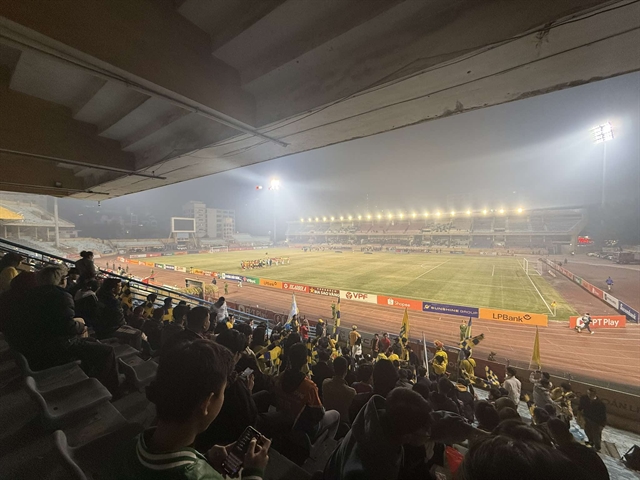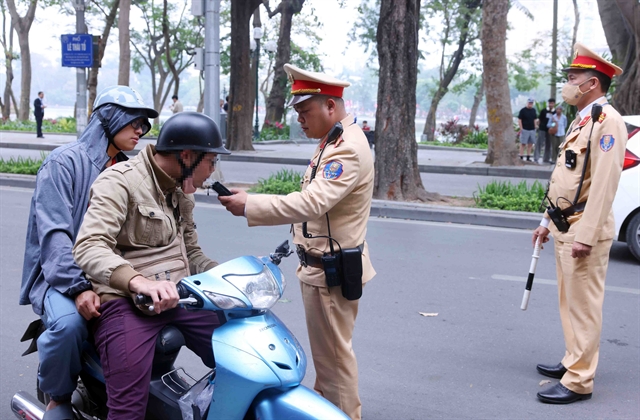 Sports
Sports

 |
| The B Stand at the Hàng Đẫy Stadium during a January 18 match between Nghệ An and Công An Hà Nội. VNS Photo Anh Đức |
Anh Đức
The V.League and the National Cup have returned, after the astounding 2024 ASEAN Championship victory by the Việt Nam national football team just two weeks ago.
However, the victory seems to have had little effect on the attendance of local football matches.
I went to a match between Sông Lam Nghệ An and Công An Hà Nội on Saturday, pitting some of the league's most hardcore fanbases against each other. But Hàng Đẫy failed to fill its seats, with around 30-40 per cent of the stadium visibly empty.
This is what happened during most of the 2024/25 season, and signalled a worrying trend that has been taking place since before the pandemic.
After the success of Vietnamese football in 2018, many new fans (some even without prior knowledge of the sport) rushed to embrace their newfound football idols, an effect similar to the "TV Concert fever" that dominated Việt Nam in 2024.
Attendance at home stadiums skyrocketed for teams like Hà Nội FC, Hoàng Anh Gia Lai and Thể Công Viettel, which boasted many national team players who have become household names. Fanbases like Hà Nội's Contras have even grown in size and number of group activities.
Total attendance at club matches grew from around one million in 2017 to 1.1 million in 2018, before peaking in 2019 at 1.3 million. Average attendance, despite hovering around a somewhat low 6,000-7,000 per match, was still among the top leagues in the region.
Regional and continental club competitions were an even more attractive affair.
I remember vividly the 2019 AFC Cup Interzone final between Hà Nội FC and North Korea's April 25 SC. There were no remaining seats, and we had to stand and watch the match. The official attendance count was 6,250 -- but the atmosphere suggested that there could be a lot more people cheering on what may have been Việt Nam's best club in the country's first major club competition final.
But when the pandemic came, matches were postponed or held behind closed doors, and then the whole tournament was cancelled. Football made its return after the Great Pause in 2022, but the fire had died down. In the past two seasons, average V.League attendance dropped significantly from 6,852 to 5,890 in 2023.
The decline of the national teams in the latter part of 2023 and the beginning of 2024 was a contributing factor. Locally, with the exception of defending champions Thép Xanh Nam Định, teams with strong fanbases such as Hải Phòng, Hà Nội, Nghệ An and Viettel also experienced a decline in performance, which led to lower attendance for these teams.
Despite being a Hanoian, I sat at Sông Lam Nghệ An's corner with a friend from Nghệ An, which gave me some ideas about how clubs can attract more fans.
Nghệ An, about one place away from direct relegation in the standings, had a travelling fan club that gave all they've got. Free tickets were sponsored and given to Nghệ An fans who live in Hà Nội by the supporters' club. Those who sat in Gate B8, where the travelling fans were situated, were also handed yellow flags with the club's crest, so that a sea of yellow was distinctively seen in the stands.
The chants and half-time songs sung by the fans also had a local Nghệ An culture and feeling that made the travellers feel like they were at home in the Vinh Stadium, and the Nghệ An fans also showed kindness, even welcoming a foreign traveller who just came to watch the match.
Those are, essentially, an example of the characteristics and culture of Nghệ An and its people. And the fact that the supporters' club, with little funding, can embody their local culture and attract fans both old and new to create a cheering atmosphere, is perhaps a formula other football clubs could look at to attract more spectators. VNS




